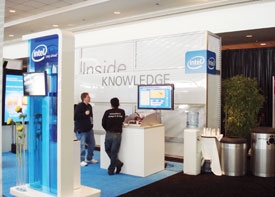
The company’s corporate affairs manager Ho Uyen told VIR that it needed more than 4,000 skilled workers during in the next several years instead of its 1,000 strong payroll now.
American-backed Intel Vietnam is hunting for skilled local workers.
The company’s corporate affairs manager Ho Uyen told VIR that it needed more than 4,000 skilled workers during in the next several years instead of its 1,000 strong payroll now.
Intel is seeking Vietnamese applicants as manufacturing technical supervisors, manufacturing technicians, shift automation engineers, IT automation support engineers and employee services specialists.
“We will continue recruiting more skilled workers because of Intel Vietnam’s facility’s expanding production capacity. Though it is not easy to seek such a big number of workers, but I think we will succeed,” Uyen said.
The European Chamber of Commerce in Vietnam said over 65 per cent of Vietnam’s workforce remained unskilled and 78 per cent of 20-24 year old people were either unskilled or skill-strapped.
In order to source its needed workers, Intel is now implementing training programmes at localities nationwide, including vocational courses to service its operations. Also, Intel and German-backed Siemens together with USAID and Arizona State Universities had been working with eight local universities partners in Vietnam in a programme called Higher Engineering Education Alliance Programme to train faculty new instructional methods.
Uyen said Intel, which had a long-term business vision in Vietnam, did not take into account the country’s low-cost labour advantages, because “the labour cost is not the determinant for Intel’s products.”
“Intel invests in Vietnam because the country promises a good future for it. Moreover, Vietnam’s labour force quality has all the more been improved, while the Vietnamese government has been giving best conditions to Intel to applying its investment strategy in the country,” she said.
Uyen said Intel faced no difficulties in performing in Vietnam and had no plan to expand its investment in other regions, besides its existing $1 billion facility in Ho Chi Minh City’s Saigon Hi-tech Park. “We commit to maximise the facility’s capacity in the near future,” she said.
The 46,000-square-metre facility, which started operations in October last year, is a state-of-the-art assembly and test manufacturing one, which will produce the latest technology microprocessors and chipsets for Intel’s global supply chain.
The facility currently has just one production line and only produces its first-generation Ibex Peak chipset. By the year’s end there would be three new lines and the firm would be producing its second generation Cougar Point chipset with a total capacity of 4.4 billion units per quarter. Intel also aims to kick-off production of the third generation Panther Point chipset in 2012, currently only manufactured in China. Intel is planning on 52 lines by the end of 2015.
To hit these targets, the company is now chasing suppliers for metal works and high precision hardware such as hand tools as well as consumables and off-the-shelf spare.
(Source: VIR)
 |
Intel is seeking Vietnamese applicants as manufacturing technical supervisors, manufacturing technicians, shift automation engineers, IT automation support engineers and employee services specialists.
“We will continue recruiting more skilled workers because of Intel Vietnam’s facility’s expanding production capacity. Though it is not easy to seek such a big number of workers, but I think we will succeed,” Uyen said.
The European Chamber of Commerce in Vietnam said over 65 per cent of Vietnam’s workforce remained unskilled and 78 per cent of 20-24 year old people were either unskilled or skill-strapped.
In order to source its needed workers, Intel is now implementing training programmes at localities nationwide, including vocational courses to service its operations. Also, Intel and German-backed Siemens together with USAID and Arizona State Universities had been working with eight local universities partners in Vietnam in a programme called Higher Engineering Education Alliance Programme to train faculty new instructional methods.
Uyen said Intel, which had a long-term business vision in Vietnam, did not take into account the country’s low-cost labour advantages, because “the labour cost is not the determinant for Intel’s products.”
“Intel invests in Vietnam because the country promises a good future for it. Moreover, Vietnam’s labour force quality has all the more been improved, while the Vietnamese government has been giving best conditions to Intel to applying its investment strategy in the country,” she said.
Uyen said Intel faced no difficulties in performing in Vietnam and had no plan to expand its investment in other regions, besides its existing $1 billion facility in Ho Chi Minh City’s Saigon Hi-tech Park. “We commit to maximise the facility’s capacity in the near future,” she said.
The 46,000-square-metre facility, which started operations in October last year, is a state-of-the-art assembly and test manufacturing one, which will produce the latest technology microprocessors and chipsets for Intel’s global supply chain.
The facility currently has just one production line and only produces its first-generation Ibex Peak chipset. By the year’s end there would be three new lines and the firm would be producing its second generation Cougar Point chipset with a total capacity of 4.4 billion units per quarter. Intel also aims to kick-off production of the third generation Panther Point chipset in 2012, currently only manufactured in China. Intel is planning on 52 lines by the end of 2015.
To hit these targets, the company is now chasing suppliers for metal works and high precision hardware such as hand tools as well as consumables and off-the-shelf spare.
(Source: VIR)





